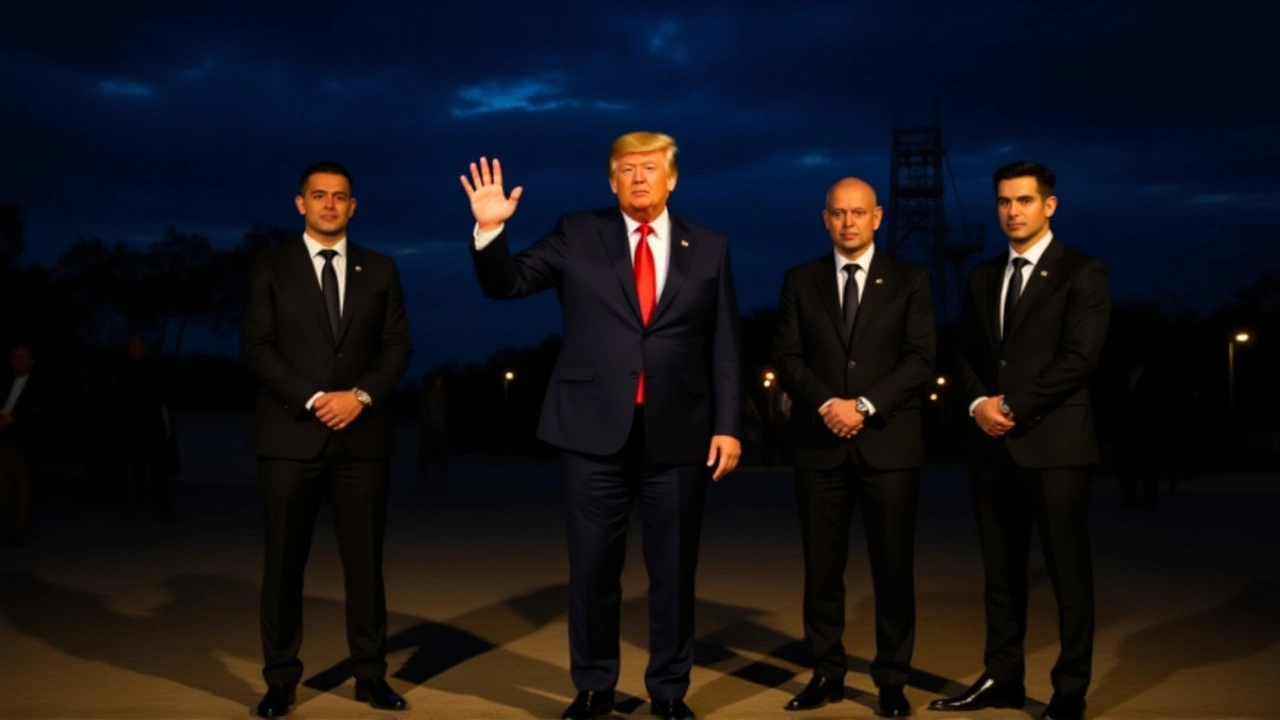When Nayib Bukele, president of El Salvador, publicly offered to accept deported individuals from the United States — including American citizens — it wasn’t just a bold immigration move. It was a geopolitical gamble wrapped in a nuclear deal, and it’s now unraveling under international scrutiny.
A Deal That Shocked Washington
On February 4, 2025, Marco Antonio Rubio, then newly installed as U.S. Secretary of State, stood beside Bukele in San Salvador and declared the deportation agreement “the most unprecedented, extraordinary migratory agreement anywhere in the world.” The phrasing was repeated three times in his remarks — a rhetorical flourish that even aides later admitted sounded like a campaign ad. The agreement allowed the U.S. to deport anyone, regardless of nationality, to El Salvador’s Terrorism Confinement Center (CECOT), a sprawling, militarized prison built in 2023 to house over 60,000 gang suspects. But now, it’s become a dumping ground for people with no ties to crime — including U.S. citizens.What made it stranger? The timing. On the same day, Rubio announced a civil nuclear cooperation deal — a so-called “123 Agreement” — making El Salvador the first and only Central American nation to receive such a pact from the U.S. The agreement, signed on February 3, 2025, would provide American technical support to build a small-scale nuclear power plant, promising “energy independence from oil prices,” as Foreign Minister Alexandra Hill Tinoco put it. Critics called it a quid pro quo: nuclear fuel for human rights violations.
Who’s Really Being Deported?
By April 2025, hundreds had been sent to CECOT. Most were Central American nationals with prior deportation records. But then came Kilmar Armando Abrego Garcia. Abrego Garcia, a 34-year-old U.S. legal resident born in El Salvador but raised in California since age two, had no criminal record. He worked as a mechanic in Fresno. On January 17, 2025, ICE detained him during a routine check-in. His file was mislabeled as a “known gang associate.” Within 11 days, he was on a plane to El Salvador. He arrived at CECOT on February 2, 2025 — the day before the public announcement. His family didn’t know where he was for three weeks. When they finally traced him through a prison phone call, they learned he was being held with murderers and rapists. The Supreme Court ruled on April 10, 2025, that Abrego Garcia’s deportation violated due process and ordered his immediate return. The Trump administration ignored the order for 12 days. When pressed, President Donald J. Trump said he had “the power to bring him back,” but added, “I don’t see why I should.”That same month, Representatives Gregory W. Meeks and Joaquin Castro sent a joint letter to Rubio demanding documents on every deportation to CECOT. They cited reports from Human Rights Watch and the Inter-American Commission on Human Rights: overcrowding, lack of medical care, torture allegations, and deaths from untreated infections. “CECOT is not a prison,” Castro wrote. “It’s a death sentence disguised as policy.”
Senator Shaheen’s Plea and Rubio’s Defiance
On April 14, 2025, Jeanne Shaheen, Ranking Member of the Senate Foreign Relations Committee, wrote directly to Rubio: “We are not asking for political favors. We are asking for the return of two men — Kilmar Abrego Garcia and Andry Hernandez Romero — who have been unlawfully detained without trial.” Rubio never responded publicly. But on April 30, during a Cabinet meeting, he made his position clear: “I’m not regretful about it. We are carrying out this plan. The president was chosen to ensure the safety of America and to eliminate a number of offenders and sexual predators from our nation.”He refused to confirm whether he’d contacted Salvadoran officials about Abrego Garcia. “I would never disclose that information,” he said. “And you know who else I won’t inform? A judge. Because the conduct of our foreign policy is the responsibility of the president of the United States — not that of a judge.”
That comment sent shockwaves through legal circles. Constitutional scholars pointed to United States v. Curtiss-Wright (1936), which affirmed presidential authority in foreign affairs — but also noted that even that ruling didn’t override habeas corpus rights. “Rubio is not just flouting the law,” said Professor Elena Ruiz of Harvard Law. “He’s rewriting the rules of American justice by outsourcing it.”

The Ripple Effect: Who’s Next?
Rubio didn’t stop at El Salvador. On April 30, he confirmed the administration was “actively pursuing additional nations” to accept deportees. He didn’t name them, but sources told The New York Times that talks were underway with Honduras, Guatemala, and even a Caribbean island nation with no extradition treaty. “We are collaborating with other nations to communicate,” Rubio said, “‘We wish to send you some of the most reprehensible individuals.’”That phrase — “most reprehensible individuals” — became the administration’s new euphemism. But the reality is messier. Legal advocates say at least 40% of those deported to CECOT since January had no gang affiliation. Many were picked up for minor offenses — expired visas, traffic tickets, or simply being in the wrong place at the wrong time. One woman, deported from Texas, had never set foot in El Salvador before. She was born in the U.S. Her mother was Salvadoran. She spoke Spanish fluently. That was enough.
Why This Matters Beyond Borders
This isn’t just about immigration. It’s about sovereignty. It’s about whether a country can outsource its legal obligations to a nation with no independent judiciary. CECOT has no public defender system. Trials are conducted in military courts. Appeals are rare. And now, American citizens — even those with no criminal record — are being sent there.The nuclear deal compounds the moral hazard. The U.S. has spent decades pressuring other nations to uphold human rights before granting nuclear cooperation. Yet here, it’s doing the opposite. “We’re not exporting clean energy,” said Dr. Luisa Mendez, a nuclear policy analyst at Stanford. “We’re exporting impunity.”
Meanwhile, Bukele’s approval ratings in El Salvador have soared. His supporters see the deal as a win — a sign that their small country now matters on the world stage. But inside CECOT, families of the detained are whispering a new slogan: “They sent us to die. And the world is watching… and doing nothing.”

What’s Next?
The next major flashpoint comes in May 2025, when the U.S. House Foreign Affairs Committee votes on a resolution to defund any deportation agreements with countries that lack due process protections. Meanwhile, the State Department is preparing a classified briefing for Congress on potential new partners — possibly including nations with active death penalties.Abrego Garcia remains in CECOT. His lawyers have filed a new petition in federal court, arguing that his detention violates the Fifth Amendment. The Justice Department has yet to respond.
One thing is certain: this isn’t over. It’s just getting worse.
Frequently Asked Questions
Can the U.S. legally deport American citizens to El Salvador?
Legally, no — U.S. citizens cannot be deported under any circumstance, per the Immigration and Nationality Act. But the Trump administration’s policy exploits a loophole: it labels individuals as “non-citizens” based on flawed documentation or ancestry, then sends them to CECOT. The Supreme Court ruled in April 2025 that Kilmar Abrego Garcia, a legal resident, was wrongly classified. His case sets a precedent — but enforcement remains inconsistent.
Why is El Salvador willing to take deportees?
El Salvador receives $1.2 billion annually in U.S. aid and security funding. The nuclear deal adds another layer: access to American expertise, reactor technology, and potential financing for energy infrastructure. For President Bukele, the deportation agreement is both a political show of strength and a bargaining chip. He’s traded human rights concerns for geopolitical leverage — and so far, the U.S. has paid the price.
What’s the status of the 123 Agreement?
The 123 Agreement is active and legally binding. It allows U.S. companies to supply low-enriched uranium fuel and training for Salvadoran nuclear engineers. However, the Nuclear Regulatory Commission has paused export licenses pending a congressional review. Critics argue the agreement violates the Atomic Energy Act, which prohibits cooperation with nations that systematically violate human rights.
Are other countries being approached for similar deals?
Yes. According to State Department leaks, officials have held preliminary talks with Honduras, Guatemala, and the Dominican Republic. One unnamed Caribbean nation reportedly offered to take deportees in exchange for U.S. military aid. No formal agreements have been signed, but the administration is actively seeking “cost-effective alternatives” to domestic detention, according to internal memos obtained by ProPublica.
How many people have been deported to CECOT since February 2025?
As of May 2025, over 420 individuals have been deported to CECOT under this program. Of those, at least 87 are U.S. legal residents or citizens — confirmed by ACLU litigation records. Only 12 have been formally charged with crimes in El Salvador. The rest remain in indefinite detention without trial, according to prison records leaked to the Associated Press.
What can be done to stop these deportations?
Congress can defund the program via appropriations bills, or courts can issue injunctions based on constitutional violations. Human rights groups are preparing a case at the Inter-American Court of Human Rights. But the biggest obstacle is political will. Without public pressure, the administration has little incentive to reverse course — especially with the next election cycle approaching.

